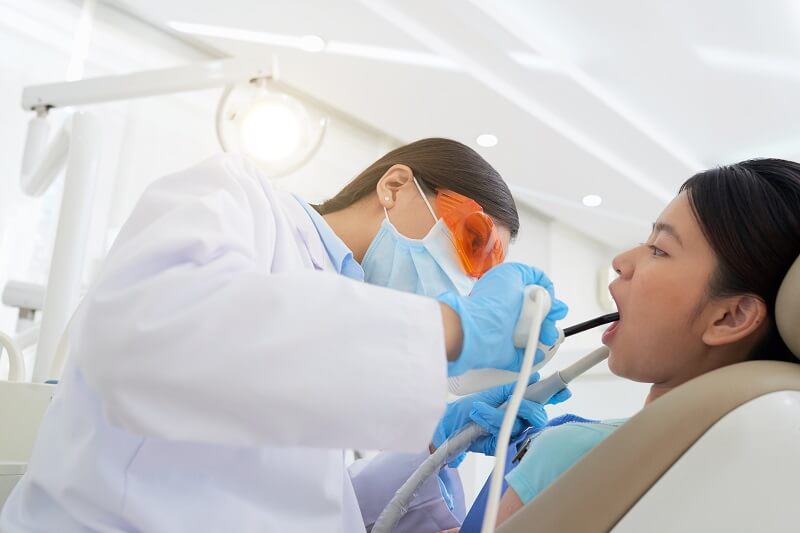
Cancer is regarded as the uncontrollable growth of cells that attack and cause damage to the surrounding tissue. It is regarded as one of the threatening diseases among human beings. Different types of cancers are visible in this world. Out of them, oral cancer is cancer that produces in the tissues of the throat or mouth. It has a relation with a larger group of cancers, namely neck and head cancers.
It can occur anywhere in the mouth, like on the lips, surface of the tongue, inside the cheek, in the upper and lower portion of the mouth, in the salivary glands and tonsils as well. This type of cancer is often treated similarly to other head and neck cancers.
One of the facts about mouth cancer is that it mostly happens after the age of 40, and is more likely to have in men (more than twice) as compared to women. Cancer is a very dreadful disease. It can be treated in the initial stages, but lots of difficulties arise in the last stages of a patient.
Your dentist might be the first person who can notify about the signs and symptoms of oral cancer. It is good if you proceed towards biannual medical check-up. Various symptoms of oral cancer include a sore on the lip or mouth that won’t heal, bleeding from the mouth, pain or difficulty swallowing, trouble wearing dentures, dramatic weight loss, a sore throat, tongue pain, a mass or growth anywhere in the mouth, a lump in the neck, an earache that won’t go away, white, red and white, or red patches in or on the mouth or lips, jaw pain or stiffness.
Cancer is generally classified in stages. Talking about oral cancer, there are four different stages mentioned below.
60 percent of all people having oral cancer get a chance to survive for five years or more. As we stated earlier, the stage at diagnosis, the higher will be the chances of survival after treatment.
Smoking items like cigarette, cigar or pipe smokers are considered as six times more likable than non-smokers to develop oral cancer. Even those who chew tobacco based items are 50 times more likely to originate mouth cancer in parts like the lining of the lips, cheek, and gums. People who take alcohol have six times more chances of oral cancer as compared to the non-drinkers.
People who have a weakened immune system, like those who have undergone an organ transplant or affected with HIV are at an increased risk for promoting oral cancer. Even having a past of oral cancer can uplift the chances of originating a second oral cancer again. If someone has a family history of oral cancer, it is the time to be attentive and take special care to avoid such types of diseases. Besides having a history of oral cancer in the family, there are particular genetic syndromes which increase the risk of producing oral cancer.
Treatment will be provided according to the type, location and stage of cancer at diagnosis. It is treated with surgery, chemotherapy, radiation therapy, targeted therapy, and other things.
It is used in the early stages to eject the tumor and the cancerous lymph nodes. Along with that, other tissue around the neck and mouth may be removed out.
This therapy involves a doctor aiming radiation beams at the tumor of a person in a particular interval of time. Advanced stages occupy the mixture of both chemotherapy and radiation therapy.
It is basically a therapy with drugs that kill cancer cells. The medication is provided either orally or with the help of intravenous line (IV).
It is another crucial aspect of oral cancer treatment. Patient who has been affected with such types of diseases often find difficulties in eating and swallow, even weight loss and poor appetite are common. So, it is beneficial to discuss the diet with the doctor or a nutritionist who can assist in planning a food menu which will be gentle for their throat and mouth to provide essential calories, vitamins, and minerals to the body.
Another form of treatment which can be used in both earlier and advanced stages of cancer is targeted therapy. Drugs of this therapy will bind to particular proteins on cancer cells and intervene with their production.
At the time of early stages, not such types of effective signs get visible over a person’s body, but those who contains a habit of smoke or are heavy drinkers must need to get regular check-ups with the dentist. Some of the symptoms and signs of mouth cancer contains pain when swallowing, poorly fitting dentures, a sensation that something is stuck in the throat, painful tongue, pain in ear or neck that does not go away, hoarse voice, jaw pain or stiffness, swelling that remains for over 3 weeks, sores or mouth ulcers that do not heal, loose teeth with no apparent reason, patches on the lining of the mouth or tongue, mainly red or red-white in colour, etc.
Poor oral hygiene may also lead towards oral cancer. Things like dried beans, peas, string beans, peppers, carrots, tomatoes, apples, peaches, pears, strawberries, nectarines, and plums are some of the fruits and vegetables which can prove to be helpful in decreasing the risk of oral cancer.